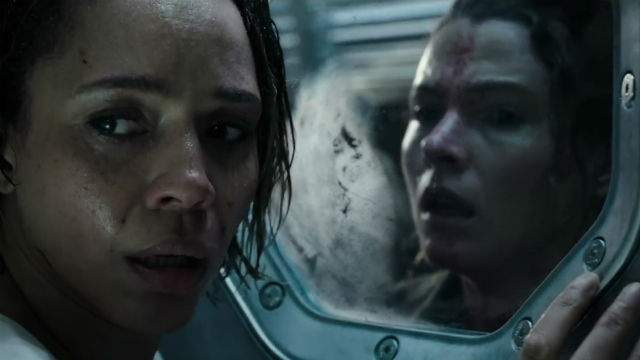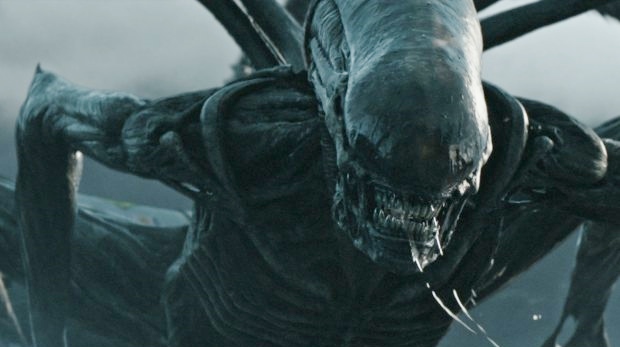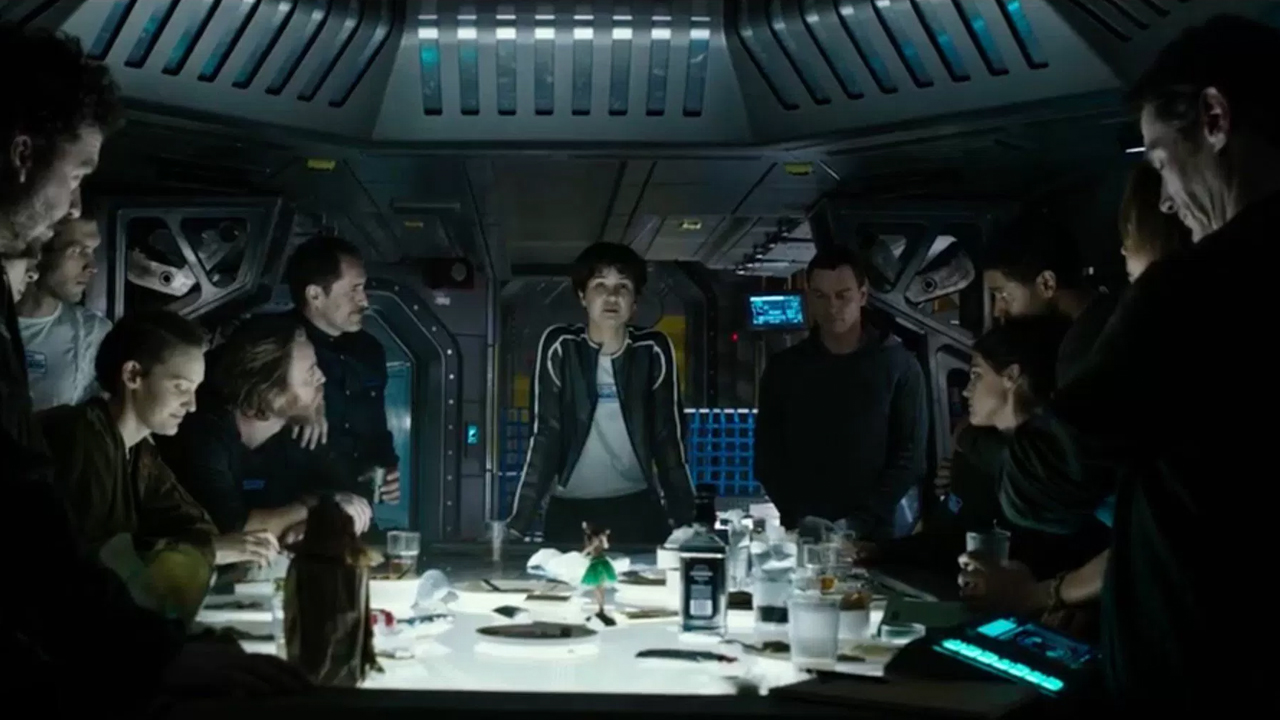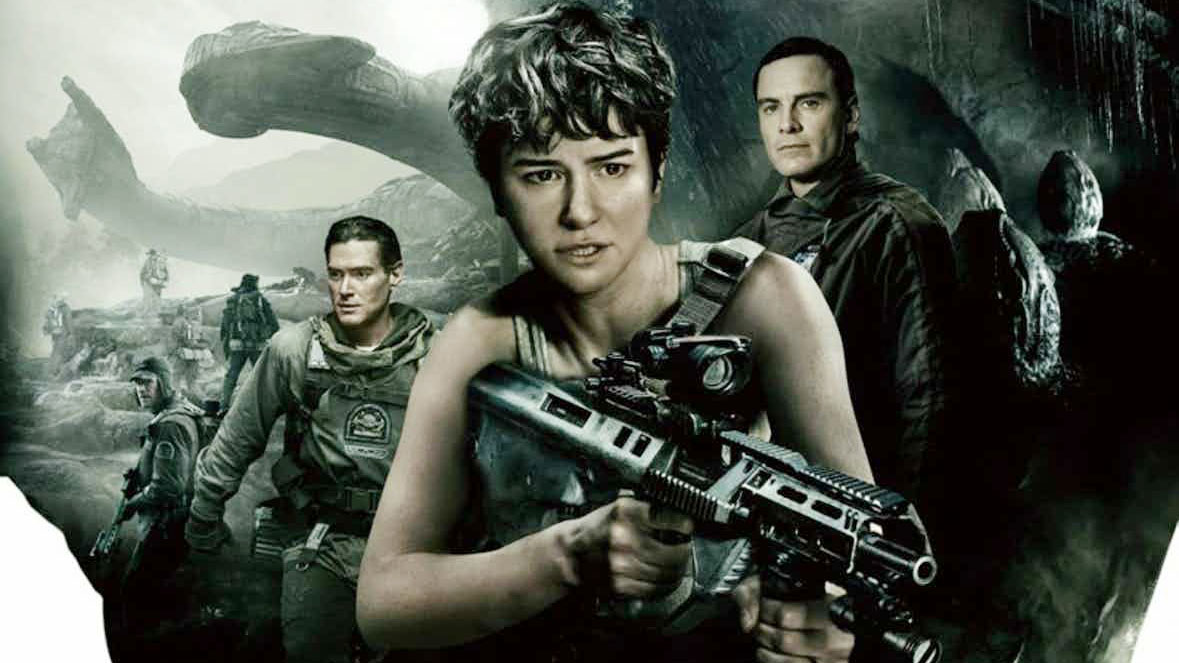GamesRadar+ Verdict
Sharper, meaner, and meatier than Prometheus, Covenant's weak narrative drive stalls its brutal good intentions.
Why you can trust GamesRadar+
HR Giger’s original Alien design featured a white, human skull under a transparent, exoskeleton dome. It’s barely noticeable in the first film due to the way the creature is lit, and has long-since dropped out of visual canon. It’s a weird thing to behold now, a creature both more and less alien than the one we know, discordantly trapped between identities and uncertain of what it is. A familiar silhouette masking something that ultimately doesn’t feel right. I’ve been thinking about that Alien a lot since seeing Covenant.
Initially appearing to do a near-flawless job of re-establishing the tone and texture of the series’ uniquely doom-laden, industrial-gothic universe, Alien: Covenant rapidly sets out a very enticing stall. Stark, uncompromising, hard-edged, and largely delivered with pleasingly underplayed grit, the film’s opening does a convincing and very deliberate job of purging the gleaming, vacuous sci-fi excess of Prometheus in favour of something altogether dirtier, more grounded, and human. It helps that liberal allusion is made to Jerry Goldsmith’s original Alien score, of course, but as disorienting events conspire to send the crew of the colony ship Covenant off-course, the proliferation of deft visual nods, canny continuity allusions, and above all, sheer feel, forge a highly convincing sense of homecoming.
Ultimately, though, it’s all smoke and mirrors. Over the course of Covenant’s running time the movie descends into an increasingly blunt series of mechanical fan-service shout-outs that eventually shatter the immersion they initially craft. A man in a monster suit rather than the real deal, the impression only skin-deep. But during the film’s startling opening salvo, leading into its belligerently uncomfortable first-act proper, it’s a very convincing impersonation.
Upon arriving at its planetary main setting, Alien: Covenant seems to reveal even braver, nastier intent. Investigating the origin of a mysterious, seemingly human broadcast (the source of which will be clear to watchers of the film’s predecessor), the ship’s away-party find a world lush with vegetation but seemingly barren of all other life. A place adorned with the kind of transfixing landscape beauty that only Ridley Scott can frame, but blanketed in a cold, unnameable wrongness. Naturally, the expedition eventually goes very wrong indeed, resulting in the film’s most exciting, shocking sequence; a gruelling, extended, panic-addled introduction to the planet’s wildlife that, while echoing the series’ traditional, brutalist body-horror, shifts the tone towards something much more malicious. Here, as on multiple occasions, Covenant plays with the visual grammar of Alien, but speaks in a different voice. A much angrier, more aggressive, more threatening one. One that definitely commands attention.

Once the adrenaline wears off, however, the film begins to unravel, having seemingly dazed itself into a stupor with its spirited, early assault. Initial focus apparently spent, it begins to flag, shamble, and lose direction. And it never recovers.
As the Covenant crew make contact with David - the android survivor of Prometheus, now fully repaired by companion Elizabeth Shaw – the film’s main plot theoretically kicks in. But it doesn’t. Because here we run headlong into Alien: Covenant’s engine room of problems. Despite the exciting, early promise of some intriguing and affectingly woven new themes, it rapidly becomes clear that the film does not, in actual fact, have a plot. Nor does it have discernable characters. Nor even a real protagonist.
Dramatically, the main focus is on David and newcomer Walter (both played by Michael Fassbender). Twin ‘droids of differing generations, they have an immediate, instinctive brotherhood between them, alongside a great deal of philosophical conflict. Walter is happy with loyal servitude, while his doppleganger has cultivated a greater sense of individuality and purpose in the years since founding his new home. But their differences are tempered by the fact that upon meeting, both have finally ceased to be effectively, inalienably alone.

There’s powerful, uncomfortable material to draw from here, and Covenant initially acts with great zeal. In a quiet, unsettlingly intimate ‘getting to know you’ scene between the two, Fassbender’s convincingly distinct performances ebb and flow in a back-and-forth of exploration and dominance, as the stark environment and subtly hellish colour palette amplify the discomfort. But then, like all of Covenant’s most interesting elements, it’s prematurely jettisoned from the film, and further hampered by a couple of misjudged, unintentionally hilarious lines bound to become memes within hours of the movie opening.
This theme of aborted potential typifies the spotty pacing and disconnected structure of Covenant’s lengthy, drawn-out middle act. While offering up multiple potential themes, story threads, and character journeys, the film never seems sure which is the most interesting, and so plays a frenetic game of Whack-a-Mole with all of them, failing to effectively explore any. Without clear roles, the cast swiftly become interchangeable (androids aside); the few with loosely defined purpose or personality standing out only because the rest have none. For all of her purported protagonist status, Katherine Waterston’s Daniels is really no such thing, her tragic backstory forgotten as soon as it has made its obligatory stab for sympathy, just as she herself blends away into the ensemble until abruptly called upon to become Designated Badass during the film’s climactic scenes. Waterston’s performance is solid, but given so little to do, her character is devoid of any kind of arc. When she eventually does step up, she’s – much like Ripley’s clone in Resurrection when compared to the real thing – a falsely engineered insta-hero rather than one grown from a meaningful journey.

Where story, character, consequence and causality should intertwine with heady, unsettling themes, we get simply a series of disjointed events, reveals, and twists in search of a plot. Twists so simplistically obvious, mind – despite the contrivance required to make them work - that they almost reject the term. And when the big narrative bombs do fall, they misfire. Don’t underestimate the statement when I tell you that Covenant’s single, big addition to Alien canon is going to kick up a heck of a controversy. Right now it feels entirely to the detriment of the monster’s traditional power and mystique, and will likely require even greater narrative gymnastics across later films to reconcile with existing canon.
If it seems odd that I haven’t discussed those titular monsters much yet, that’s because the film doesn’t seem terribly concerned with them either. While its story ideas threaten to unravel the enigmatic beast’s vital essence, perhaps Covenant’s greatest crime is the loveless, matter-of-fact way it presents the creatures when they do appear. Although wisely keeping the xenomorph off-screen for much of the film, by failing to give its appearances any real weight – a combined result of scattershot story and characterisation, with rushed, bluntly paced horror direction – that absence leads not to the ominous, paranoid dread it should, but rather a simple lack of presence. These are monsters in form and function, but are rarely treated as effective psychological terrors. Covenant might be aggressively bloody and high of bodycount, but it’s rarely intimidating.

So, when the long, flat (yet strangely uneven) middle act finally gives way to bombastic action - by way of a jarringly overblown sequence with tone and choreography more befitting the grittier end of the Marvel Cinematic Universe - it feels not like the desperate, scrappy battle of inter-species survival intended, but a visually impressive yet emotionally empty adrenalin shot, delivered simply to push the film over the finish line. And with that set-piece quickly giving way to a second, dispassionately paced, seen-it-before climax (in which bizarrely, no-one but the Alien ever feels in danger), the unremitting lack of tension surrounding the beast will likely have you mentally checking out before the end.
Alien: Covenant then, is a deeply frustrating film. Promising the atmosphere and focus that typifies the series at its best – and for a time, delivering with raw power - it ultimately serves a great deal of the opposite, meting out the core elements of story, character, drama, and horror only in fits and starts. There are dashes of intrigue here, but by fuelling a full, two-hour running time with little more than expositional teases, the ultimate experience is slight and unable to satisfy. A very different, more interesting mess than Prometheus then, but a mess all the same.
Looking to go deeper on Alien: Covenant? Here are eight big story questions I had after watching it.




